Tata Group
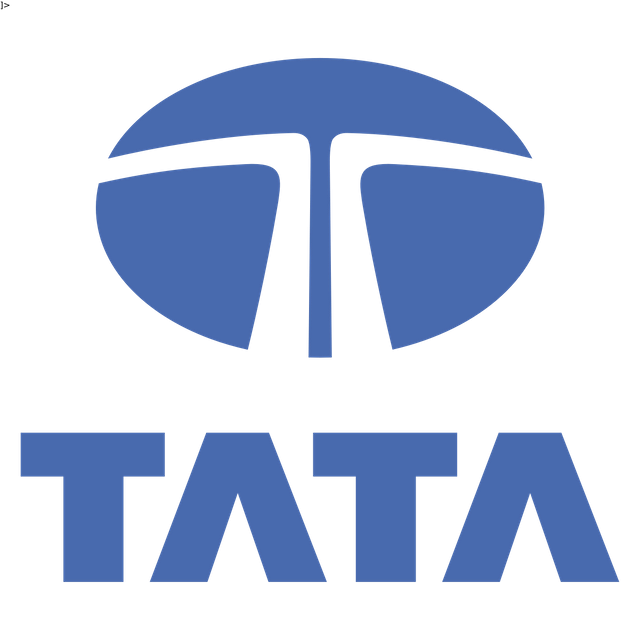
Tata Group

 Tata Group's headquarters, the Bombay House | |
Type | Public |
|---|---|
| Industry | Conglomerate |
| Founded | 1868 (1868) |
| Founder | Jamsedji Tata |
| Headquarters | Bombay House, Mumbai, Maharashtra, India |
Area served | Worldwide |
Key people | Natarajan Chandrasekaran(Chairman)[1] |
| Products |
|
| Revenue | |
| Owner | Tata Sons |
Number of employees | 702,454 (2018)[2] |
| Subsidiaries | List of subsidiaries |
| Website | www.tata.com [42] |
Tata Group (/ˈtɑːtɑː/) is an Indian multinational conglomerate holding company headquartered in Mumbai, Maharashtra, India. Founded in 1868 by Jamsetji Tata, the company gained international recognition after purchasing several global companies. One of India's largest conglomerates, Tata Group is owned by Tata Sons.[3][4]
Each Tata company operates independently under the guidance and supervision of its own board of directors and shareholders. Significant Tata companies and subsidiaries include Tata Steel, Tata Motors, Jaguar Land Rover, Tata Consultancy Services, Tata Advanced Systems Limited, Tata Power, Tata Chemicals, Tata Global Beverages, Tata Coffee, Tata Teleservices, Titan, Voltas, Tata Cliq, Tata Communications, and The Indian Hotels Company Limited (Taj Hotels), TATA Autocomp Systems Ltd.
 Tata Group's headquarters, the Bombay House | |
Type | Public |
|---|---|
| Industry | Conglomerate |
| Founded | 1868 (1868) |
| Founder | Jamsedji Tata |
| Headquarters | Bombay House, Mumbai, Maharashtra, India |
Area served | Worldwide |
Key people | Natarajan Chandrasekaran(Chairman)[1] |
| Products |
|
| Revenue | |
| Owner | Tata Sons |
Number of employees | 702,454 (2018)[2] |
| Subsidiaries | List of subsidiaries |
| Website | www.tata.com [42] |
History
1845–1904
At the age of 29, Jamsetji Tata worked in his father's company. In 1870 with Rs.21,000 capital, he found a trading company. Further he bought a bankrupt oil mill at Chinchpokli and converted it into a cotton mill, under the name Alexandra Mill which he sold in profit after 2 years. In 1874, he set up another cotton mill at Nagpur named as Empress Mill. He dreamed of achieving 4 goals, setting up an iron and steel company, a unique hotel, a world-class learning institution and a hydro-electric plant. During his lifetime, in 1903, the Taj Mahal Hotel at Colaba waterfront was opened making it the first hotel with electricity in India.
1904–1938
After Jamsetji's death, his older son Dorabji Tata became the Chairman in 1904. Sir Dorabji established the Tata Iron and Steel company (TISCO), now known as Tata Steel in 1907. Marking the group's global ambitions, Tata Limited opened its first overseas office in London. Following the founder's goals, Western India's first hydro plant was brought to life, giving birth to Tata Power. Yet another dream, Indian Institute of Science was established with the first batch admitted in 1911.
1938–1991
JRD Tata was made Chairman of Tata Group in 1938. Under his chairmanship, the assets of the Tata Group grew from US$100 million to over US$5 billion. Starting with 14 enterprises, upon his departure half a century later in 1988, Tata Sons had grown to a conglomerate of 95 enterprises. These enterprises consisted of ventures that the company had either started or in which they held controlling interest.
In 1952, JRD founded an airline, known as Tata Air Services (later renamed Tata Airlines). In 1953, the Government of India passed the Air Corporations Act and purchased a majority stake in the carrier from Tata Sons, though JRD Tata would continue as Chairman till 1977.
In 1945, Tata Motors was founded, first focused on locomotives. In 1954, it entered the commercial vehicle market after forming a joint venture with Daimler-Benz. In 1968, Tata Consultancy Services was founded.
1991–present
In 1991, Ratan Tata was made Chairman of Tata Group. This was also the year of economic liberalization in India, opening up the market to foreign competitors. During this time, Tata Group began to acquire a number of companies, including Tetley (2000), Corus Group (2007), and Jaguar and Land Rover (2008). In 2017, Natarajan Chandrasekaran was appointed chairman.
Chairman
The Chairman of Tata Sons is usually the Chairman of the Tata Group.
Jamsetji Tata (1868–1904)
Sir Dorab Tata (1904–1932)
Nowroji Saklatwala (1932–1938)
JRD Tata (1938–1991)
Ratan Tata (1991–2012)
Cyrus Mistry (2012–2016)
Ratan Tata (2016-2017)
Natarajan Chandrasekaran (2017–present)[5]
Subsidiaries
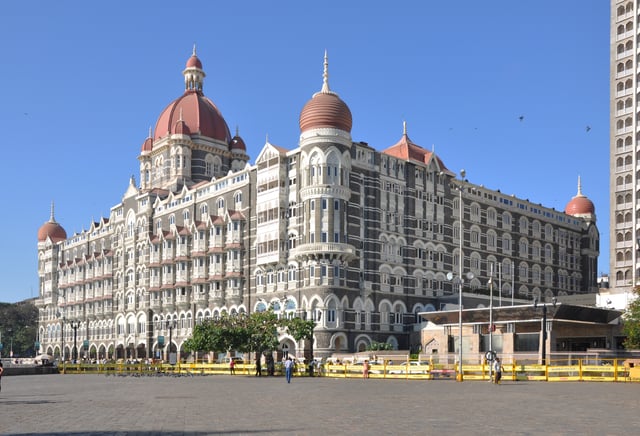
The Taj Mahal Palace Hotel, owned by a Tata subsidiary
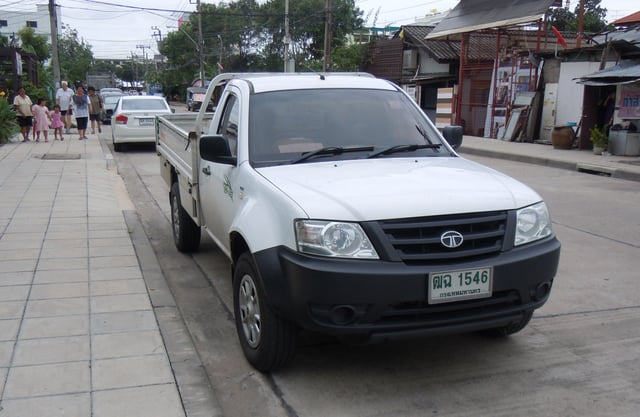
Thai assembled Tata Xenon pickup truck
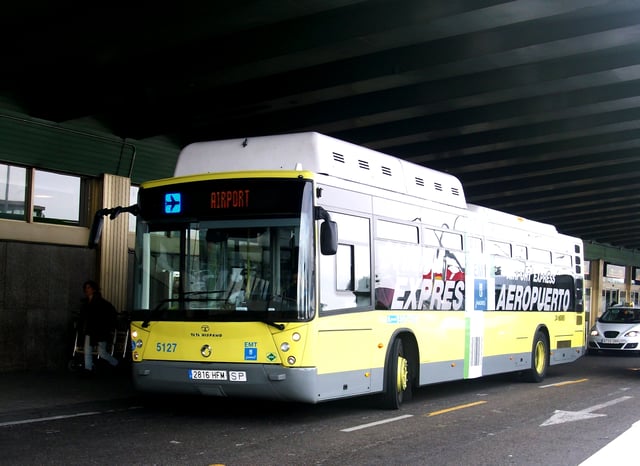
Tata bus in Madrid, Spain
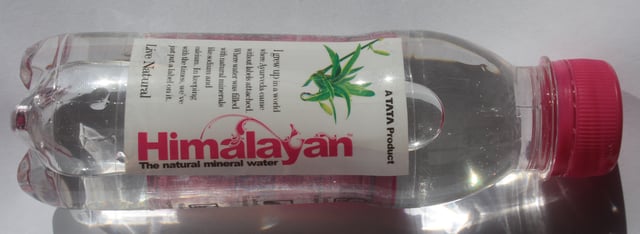
Himalayan–Tata Mineral Water
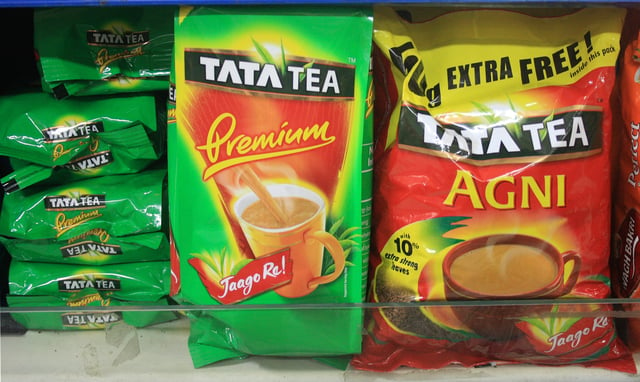
Packages of Tata Tea
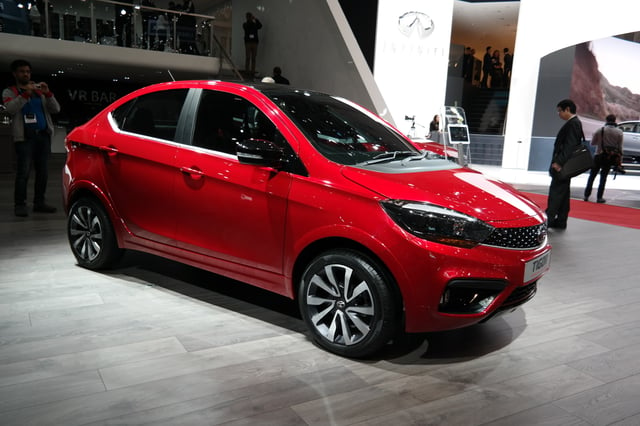
Tata Tigor
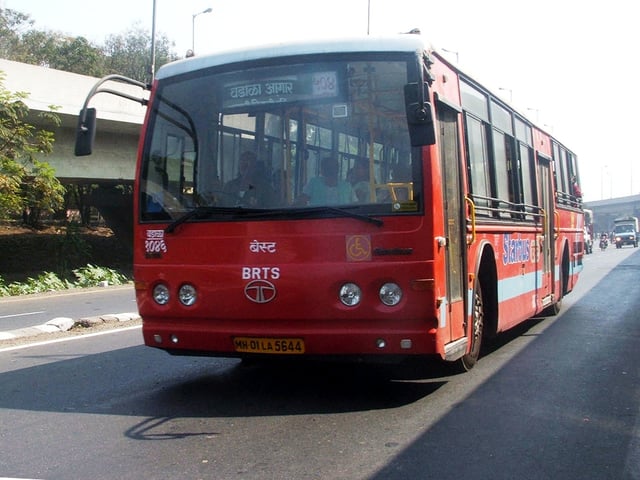
Tata Bus
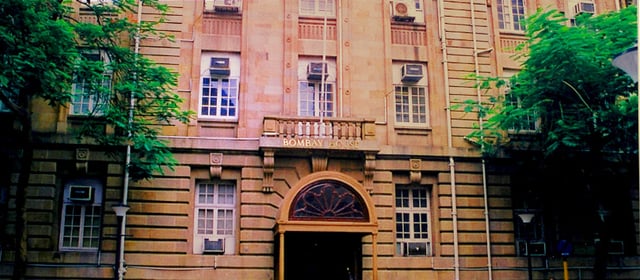
Bombay House, the head office of Tata Group
This section lists the Tata companies and details their business:
Chemicals
Tata Chemicals
Advinus Therapeutics
Brunner Mond
General Chemical Industrial Products
Magadi Soda Company
Rallis India
Tata Pigments Limited
Consumer products
Casa Décor
Eight O'Clock Coffee
Fastrack, youth fashion brand
Himalayan, mineral water brand
I-shakti
Infiniti Retail (Cromā)
Landmark Bookstores
Tanishq
Tata Ceramics
Tata Coffee
Tata Global Beverages, second-largest global manufacturer of tea products
Tata Industries
Tata International Ltd.
Tata Refractories
Tata Salt
Tata Sky
Tata Starbucks, a 50:50 joint venture company, owned by Starbucks Corporation and Tata Global Beverages
Tata Swach
Tata Zoya
Tetley
Titan Industries Titan Eye Plus (Titan Eye+), Titan Industries optical stores
Voltas, consumer electronics company
Westside
Energy
Hooghly Met Coke and Power Company
Jamshedpur Utilities and Services Company
Powerlinks Transmission
Tata Petrodyne
Tata Power, one of the largest private sector power companies
Tata Power Delhi Distribution Ltd (formerly known as North Delhi Power Ltd)
Tata Power Solar, started as a joint venture between Tata Power and BP Solar, now a wholly owned company
Tata Power Trading
Tata Projects
Engineering
Hispano Carrocera
TAL Manufacturing Solutions
TASL (Tata Advanced Systems Limited)
Tata Advanced Materials
Tata Advanced Systems
Tata AutoComp Systems Limited (TACO)
Tata Consulting Engineers Limited
Tata Marcopolo
Tata Cummins
Tata Motors, India's largest manufacturer of commercial vehicles and passenger cars; parent company of: Jaguar Land Rover (manufacturing cars under the Jaguar and Land Rover marques) Tata Daewoo Commercial Vehicle
Tata Motors European Technical Centre
Tata Petrodyne
Tata Precision Industries
Tata Projects
Tata Technologies Limited
Telco Construction Equipment
Telcon Construction Equipment
TRF
Voltas Global Engineering Centre
TitanX
Information systems and communications
CMC Limited
Computational Research Laboratories
INCAT
Nelco Ltd.
Nelito Systems
Tata Business Support Services
Tata Communications
Tata Consultancy Services Ltd. (TCS), one of the world's largest IT services companies
Tata DoCoMo
Tata Elxsi
Tata Interactive Systems
Tata Teleservices
Tatanet, managed connectivity and VSAT service provider
VSNL International Canada
Services
Indicash ATM (First & Largest White Label ATM Network)
Air Asia India joint venture with Air Asia
Drive India Enterprise Solutions
e-Nxt Financials Ltd.
The Gateway Hotels & Resorts
Ginger Hotels
The Indian Hotels Company
Mjunction
Roots Corporation
Taj Hotels
TajAir
Tata Advanced Systems Limited
Tata Africa Holdings
Tata AG
TATA AIA Life Insurance
TATA AIG General Insurance
Tata Asset Management
Tata Communications Payment Solutions (Banking and Financial Services)
Tata AutoComp Systems
Tata Capital
Tata Financial Services
Tata Housing Development Company Ltd. (THDC)
Tata Industrial Services
Tata Interactive Systems
Tata International AG
Tata Investment Corporation
Tata Limited
Tata NYK
Tata Quality Management Services
Tata Realty and Infrastructure Limited
Tata Services
Tata Strategic Management Group
TKM Global, Logistics and Supply Chain
Vistara joint venture with Singapore Airlines
Vivanta By Taj
Steel
JAMIPOL
NatSteel Holdings
Tata Bearings
Tata BlueScope Steel
Tata Metaliks
Tayo Rolls
Tata Sponge Iron
Tata Steel
Tata Steel Europe
Tata Steel KZN
Tata Steel Processing and Distribution
The Tinplate Company of India
TM International Logistics
Tata steel BSL
Acquisitions:
February 2000 – Tetley Tea Company, $407 million[6]
March 2004 – Daewoo Commercial Vehicle Company, $102 million
August 2004 – NatSteel's Steel business, $292 million
November 2004 – Tyco Global Network, $130 million
July 2005 – Teleglobe International Holdings, $239 million
October 2005 – Good Earth Corporation
December 2005 – Millennium Steel, Thailand, $165 million
December 2005 – Brunner Mond Chemicals, $10 million
June 2006 – Eight O'Clock Coffee, $220 million
November 2006 – Ritz Carlton Boston, $170 million
January 2007 – Corus Group, $12 billion[7]
March 2007 – PT Kaltim Prima Coal (KPC) (Bumi Resources), $1.1 billion
April 2007 – Campton Place Hotel, San Francisco, $60 million
January 2008 – Imacid Chemical Company, Morocco[8]
February 2008 – General Chemical Industrial Products, $1 billion
March 2008 – Jaguar Cars and Land Rover, $2.3 billion
March 2008 – Serviplem SA, Spain
April 2008 – Comoplesa Lebrero SA, Spain
May 2008 – Piaggio Aero Industries S.p.A., Italy - Sold Off in 2015
June 2008 – China Enterprise Communications, China
October 2008 – Miljo Grenland / Innovasjon, Norway
April 2010 – Hewitt Robins International, United Kingdom
July 2013 – Alti SA, France
December 2014 – Energy Products Limited, India
June 2016 – Welspun Renewables Energy, India
May 2018 – Bhushan Steel Limited, India
Philanthropy
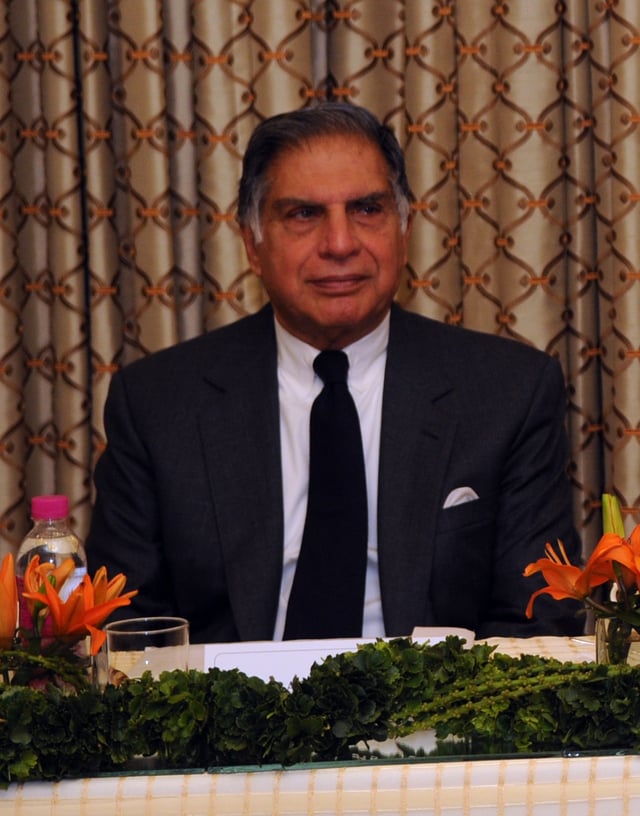
Ratan Tata, the former chairman of Tata Group[17]
The Energy and Resources Institute (formerly known as Tata Energy and Research Institute), a non-governmental research institute
The JRD Tata Ecotechnology Centre
National Centre for Performing Arts
Tata Center for Technology & Design at Massachusetts Institute of Technology[12]
Tata Centre for Technology & Design at IIT Bombay[13]
Tata Cricket Academy
Tata Football Academy
Tata Institute of Social Sciences
Tata Management Training Centre
Tata Medical Center, inaugurated on 16 May 2011 by Ratan Tata[14]
Tata Memorial Hospital
Tata Cancer Hospital
Tata Trusts, a group of philanthropic organisations run by the head of the business conglomerate Tata Sons
In 2008, Tata Group donated US$50 million to Cornell University for "agricultural and nutrition programs in India and for the education of Indian students at Cornell."[15]
In 2010, Tata Group donated ₹ 2.20 billion ($50 million) to the Harvard Business School (HBS) to build an academic and a residential building for executive education programmes on the institute's campus in Boston, Massachusetts, now Tata Hall,[16] which is the largest endowment received by HBS from an international donor.
In 2017, Tata Football Academy won the bid to form the Jamshedpur FC, a football club based on Jamshedpur of Jharkhand in the 4th edition of the Indian Super League.
Controversies and criticisms
The Tata Group has also attracted some controversy during its more than 150 years in operation, notably:
Munnar, Kerala
The Kerala Government filed an affidavit in the high court alleging that Tata Tea had "grabbed" forest land of 3,000 acres (12 km2) at Munnar. The Tatas provided that they possessed 58,741.82 acres (237.7197 km2) of land, which they are allowed to retain under the Kannan Devan Hill (Resumption of Lands) Act, 1971, and there was a shortage of 278.23 hectares in that. The Chief Minister of Kerala V.S. Achuthanandan, who vowed to evict all on government land in Munnar, formed a special squad for the Munnar land takeover mission and started acquiring back properties. However, the mission was aborted due to both influential land-holders and opposition from Achuthanandan's own party.[18]
Kalinganagar, Odisha
On 2 January 2006, Kalinganagar, Odisha villagers protested the construction of a compound wall on land historically owned by them, for a Tata steel plant. Police opened fire at a crowd after a policeman was gruesomely killed by the mob.[19]
Supplies to Burma's military regime
In December 2006, Myanmar's chief of general staff, General Thura Shwe Mann, visited the Tata Motors plant in Pune.[20] In 2009, TATA Motors announced that it would manufacture trucks in Myanmar. Tata Motors reported that these contracts to supply hardware and automobiles to Burma's military were subsequently criticised by human rights activists.[21][22]
Singur land acquisition
The Singur controversy[23] in West Bengal was a series of protests by locals and political parties over the forced acquisition, eviction, and inadequate compensation to those farmers displaced for the Tata Nano plant, during which Mamata Banerjee's party was widely criticised as acting for political gain. Despite the support of the Communist Party of India (Marxist) state government, Tata eventually pulled the project out of West Bengal, citing safety concerns. Narendra Modi, then Chief Minister of Gujarat, made land available for the Nano project.[24]
On Aug 31, 2016, in a historic judgement, the Honorable Supreme Court of India set aside the land acquisition by the West Bengal Government in 2006 that had facilitated Tata Motors' Nano plant, stating that the West Bengal government had not taken possession of the land legally, and were now required to repossess and return it to local farmers within 12 weeks without compensation.[25]
Dhamra Port, Odisha
The Port of Dhamara has received significant coverage, sparking controversy in India, and in Tata's emerging global markets.[26] The Dhamra port, an equal joint venture between Tata Steel and Larsen & Toubro, has been criticised for its proximity to the Gahirmatha Sanctuary and Bhitarkanika National Park by Indian and international organisations, including Greenpeace; Gahirmatha Beach is one of the world's largest mass nesting sites for the Olive Ridley Turtle, and India's second largest mangrove forest, Bhitarkanika, is a designated Ramsar site, and critics claimed that the port could disrupt mass nesting at Gahirmtha beaches as well as the ecology of the Bitharkanika mangrove forest.[27][28] TATA Steel employed mitigation measures set by the project's official advisor, the International Union for Conservation of Nature (IUCN), and the company pledging to "adopt all its recommendations without exception" when conservation organisations asserted that a thorough environmental impact analysis had not been done for the project, which had undergone changes in size and specifications since it was first proposed.[29]
Proposed soda extraction plant in Tanzania
In 2007, Tata Group joined forces with a Tanzanian company to build a soda ash extraction plant in Tanzania.[30] Environmental activists oppose the plant because it would be near Lake Natron, and it has a very high chance of affecting the lake's ecosystem and its neighbouring dwellers,[31] jeopardising endangered Lesser Flamingo birds. Lake Natron is where two-thirds of Lesser Flamingos reproduce.[32] Producing soda ash involves drawing out salt water from the lake, and then disposing the water back to the lake. This process could interrupt the chemical makeup of the lake.[30] 22 African nations signed a petition to stop its construction.[30]
Epic Systems trade-secret case judgement
In April 2016, a U.S. Federal Grand Jury awarded Epic Systems a $940 million judgement against Tata Consultancy Services and Tata America International Corp. Filed 31 October 2014; the suit charged that "6,477 unauthorized downloads could be used to enhance Tata's competing product, Med Mantra."[33][34][35] In 2017, U.S. District Court Judge William Conley reduced the Award to $420 million; the company states that the judgement is also being appealed, as "not supported by evidence presented during the trial and a strong appeal can be made to superior court to fully set aside the jury verdict.”[36]
2018 NCLT verdict
2016 fire at headquarters
On 16 June 2016, an electrical short-circuit sparked a fire at Tata Group corporate headquarters in Mumbai. Owing to quick containment, no casualties were reported.[39]
See also
Pallonji Mistry
Noel Tata
Sir Dorabji Tata and Allied Trusts
Tata Communications
Tata Consultancy Services
Make in India
Make in Maharashtra
Fauji Foundation